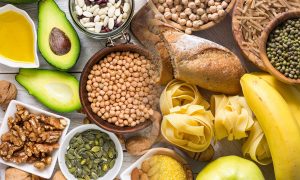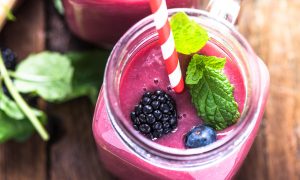Five Of The Healthiest Vegetables On The Planet

|
|
When people talk about healthy foods, fresh veggies are obviously up there as the absolute bests of all time, and for very good reason too. Vegetables are nutritionally dense, they’re packed full of goodness, they’re incredibly versatile, they taste great, there is so much variety to choose from, and they’re all natural and extremely affordable as well. So then, if vegetables are indeed as good as people make them out to be, and believe us, they are and more, why aren’t enough of us meeting our daily recommended intake of fresh fruits and vegetables? In order to reap the benefits associated with fresh veggies, experts recommend consuming at least five portions a day. Unfortunately, many of us don’t get anywhere close to that amount. Perhaps if we understood exactly what it is that makes fresh vegetables so nutritious and healthy, and indeed which ones are considered the absolute best of the best, we’d be able to change our eating habits and incorporate more of these superfoods into our daily diets? To help give a better understanding of some of the healthiest vegetables on the planet, and what it is that makes them so healthy, here’s a look at five of what many people consider to be the healthiest vegetables in the entire world.
Carrots

Ask somebody to name you a vegetable and more often than not the answer leaving their lips will indeed be carrots, so naturally carrots are considered one of, if not the most, healthiest vegetable in the entire world. Carrots not only taste great, but they can also be consumed in a number of different ways. They can be boiled, steamed, grilled, roasted, grated, eaten raw, and even juiced, and due to their naturally high natural sugar content, they taste great both cooked, and in their raw form. Carrots are crammed full of fiber, they’re rich in vitamin K, they’re full of beta-carotene, vitamin C, vitamin A, and Lutein. Lutein is a potent and powerful carotenoid that is most commonly found concentrated within the retinas of our eyes. Naturally then, carrots are especially beneficial when it comes to our eyesight. In fact, you may have heard the old saying that goes something like “eating carrots will let you see in the dark”. Whilst that’s not quite true, you can see (pardon the pun) where the saying originated from as carrots are extremely beneficial when it comes to our eyesight. Not only that, but there is also strong evidence to suggest that a diet rich in Lutein may actually be able to help prevent the risk of cardiovascular disease as well. The naturally high nutrient content in carrots also makes them very beneficial for our immune systems.
Sweet potatoes
Some people may not even consider the humble sweet potato to be a vegetable at all but whatever your opinions on sweet potatoes may be, one thing we can agree on is that they taste pretty darn great. Sweet potatoes are loaded up with dietary fiber, potassium, magnesium, vitamin C, vitamin A, and vitamin D. The vitamin C helps improve and regulate the immune system, whereas the potassium and magnesium help to prevent muscle crams and improve joint health and mobility. The vitamins A and D also help by strengthening the eyes, and indeed the immune system respectively.
Swiss chard

Next up on our list we have Swiss chard. Swiss chard is a leafy green vegetable that is considered a very effective anti-cancer food. This green leafy vegetable is a staple part of many Mediterranean dishes and is actually able to cover multiple nutrient bases simultaneously, making it a real winner in our eyes. Not only is it rich in vitamins, antioxidants, and fiber, it is also a great source of plant-based protein, and minerals too. Swiss chard is particularly rich in Lutein, vitamin K, potassium, vitamin C, and calcium. It is particularly renowned for its digestive health boosting qualities, which experts put down to its naturally high dietary fiber content. The dietary fiber helps sweep the digestive tract, ridding it of toxins and free radicals and helping to keep it healthy by restoring healthy bacteria, which in turn increases nutrient absorption. In its raw form, this vegetable does have a slightly bitter taste that is quite an acquired taste, and if you’re not a fan, the best thing to do is to roast or sauté the leaves as this will mellow out the flavour, giving them an almost bitter-sweet aftertaste.
Kale
Kale is another green leafy vegetable that is absolutely crammed full of natural goodness. It has been consumed for centuries upon centuries and is still just as popular now as it was back then. Kale is full of vitamins including vitamins: A, C, K, and B6. What’s more is the fact that it is also full of minerals including zinc and iron, which help improve the immune system and blood health respectively. Kale is also very rich in calcium, making it fantastic for the bones, and for helping to treat and prevent joint and bone conditions such as arthritis and osteoporosis. When we think of calcium, we think of cow’s milk but in actual fact, pound for pound, kale contains more calcium than milk. For best results it is advised that Kale be consumed in its raw state as cooking removes some of the nutrient content. When massaged with olive oil and a little seasoning, the leaves taste fantastic. Alternatively, you can purchase a juicer and juice the raw leaves with various other fruits and vegetables instead.
Spinach
It won’t have the same effect on you as it did on popeye, but what spinach will do is help provide numerous vitamins and minerals that your body thrives upon. In particular, spinach is rich in iron which is essential for optimal blood health and haemoglobin production. Haemoglobin helps transfer oxygen around the body in the bloodstream, which in turn will benefit all of the major organs and cells it is delivered to. Unlike most other vegetables, spinach’s nutritional profile is actually increased when it is cooked slightly.














